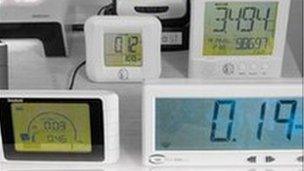Q&A: Smart meters
- Published

There are a number of electricity monitors already available in the UK
The government is unveiling plans for every home in Britain to be equipped with smart meters by the end of 2019.
It has said that energy suppliers will be responsible for installing the meters in 30 million homes.
So how will this affect householders, and will it cost or save them money?
What is expected to happen?
The government wants every home in Britain to be installed with smart meters - a device that shows exactly how much gas and electricity is being used.
This should bring an end to estimated bills, because the technology could send back an accurate meter reading to your energy company every day.
According to the industry, the technological advance would be the equivalent of using wireless broadband instead of sending a telegram.
No more estimates. Will that mean they get my bill correct?
There have been thousands of complaints from householders who claim they have been overcharged on direct debit bills.
Consumer groups said this meant energy suppliers were getting free loans from customers. Regulator Ofgem has told the companies to make charges clearer, but said there was no "systematic" abuse of the direct debit system.
Smart meters should put this debate to bed and would mean that householders no longer need to let the gasman in to read the meter.
People might even be able to check their usage on the internet, or share tips for cutting bills on social networking websites.
But installing these meters will be a big job. Some 53 million electricity and gas meters will need to be fitted.
That sounds expensive. Who pays?
You will not receive a bill from your energy company for installing a new meter, but you will pick up some of the cost in your usual bill.
Energy Minister Charles Hendry says the £11.1bn cost of introducing them to 30 million homes and firms from 2014 to 2019 would reap an £18.1bn benefit.
The savings will be made by companies who no longer need to pay people to read meters, and the cost of dealing with complaints should fall.
The Commons public accounts committee says that the government must ensure that energy companies pass on these savings to consumers, rather than just boosting their own profits.
Meanwhile, the consumers' association Which? has said the installation programme should be halted, because it is in danger of becoming a "fiasco" owing to spiralling costs.
It is hoped that smart meters may prompt householders to change their habits. These savings might come by switching off the television, rather than leaving it on standby.
How do I get one of these meters?
There are trials and early installations of smart meters going on at the moment, so some householders have already got them.
Under the plans, each home would get a new smart gas meter and a new electricity meter. One is the "host" meter, that will communicate with you and the supplier.
The responsibility to install them will fall to the energy suppliers, rather than the distribution networks.
Will this make it more difficult to switch supplier to save on bills?
There is different branding on smart meters, made by different companies.
However, the plan is for all types of meters to have the same specifications, so if you want to switch suppliers you will not need to get a new meter installed.
These specifications are still being ironed out among suppliers before the main roll-out begins.
Switching suppliers to get a better deal should be as easy as it is now.
You will not get a different meter if you pay in different ways - such as pre-payment or quarterly by cheque.
What about bills at business properties?
Large businesses should have smart meters relatively quickly.
Small businesses should get smart meters in the same time-frame as consumers.
- Published17 January 2012
- Published15 January 2012
- Published8 February 2011
- Published27 May 2010